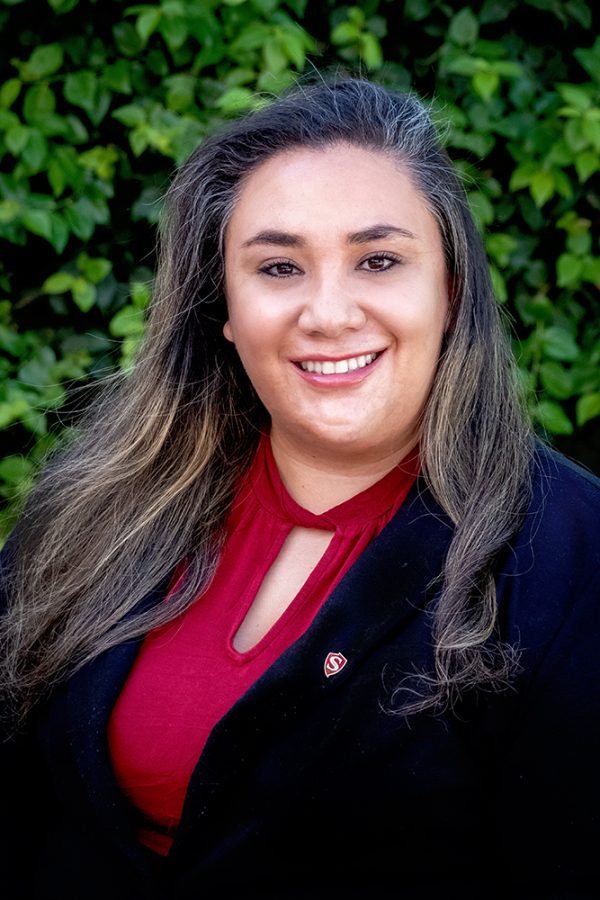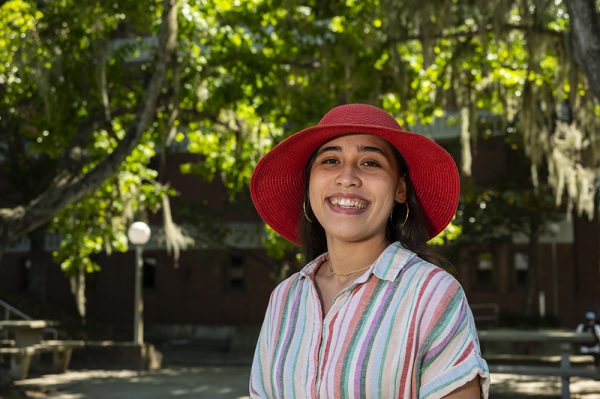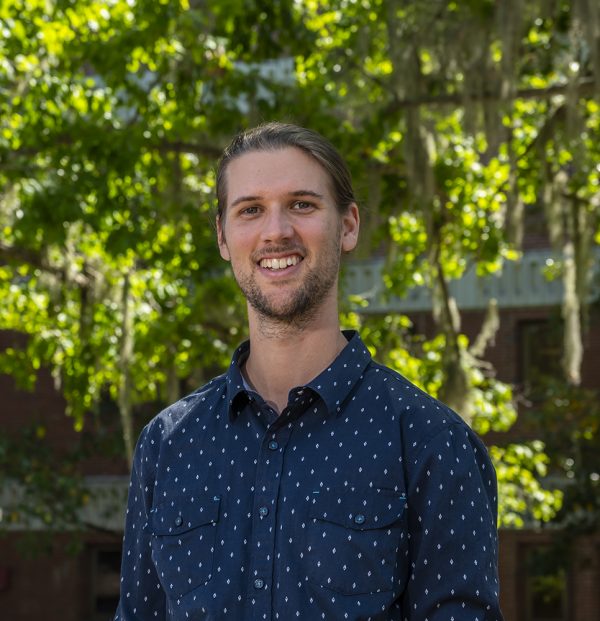The Florida Museum of Natural History has announced the winners of the annual Austin and biodiversity graduate student awards.
Jeanette Pirlo, who recently completed a doctorate in biology, and Indah Huegele, a current doctoral candidate studying paleobotany, both received the 2023 Austin Award for student research and significant contributions to the development of museum collections and programs. Michael Belitz, a doctoral candidate in zoology, will receive the award for excellence in biodiversity to foster research in emerging fields of conservation science.
All three will be presented with their awards during a ceremony at the Dickinson Hall courtyard Wednesday, April 5 at 12:30 p.m.
Funding for the Austin and biodiversity awards is provided by the Louis C. and Jane Gapenski Endowed Fellowship.
 Austin Award: Jeanette Pirlo
Austin Award: Jeanette Pirlo
Pirlo studied vertebrate paleontology and worked primarily with the gomphothere population at the Florida Museum’s Montbrook fossil site in Williston, estimated to be 5 million to 5.5 million years old. By comparing their skulls, jaws and teeth to those of other elephants from the same period, she was able to glean information on the diet, size and age distribution of the region’s gomphothere population. Her research also indicated that during this time, herbivores thrived, suggesting that the area was lush with diverse plant life, which reduced their need to compete for resources.
Pirlo also made natural history collections more accessible to teachers and undergraduate students through mentorship and paid summer internships. The National Science Foundation-funded iDigBio Summer Internship program she helped establish has supported nearly 30 undergraduate students from varying backgrounds, including historically excluded groups, in their research in natural history collections around the country.
“Community engagement is at the center of everything I do,” Pirlo said. “It’s not so much about getting people to become geologists or paleontologists, but rather getting people excited to study what they want to study, whether that’s formally or as a hobby. My interest is in providing those experiences for people while compensating them for their time.”
Pirlo graduated in the summer and is now an assistant professor of evolutionary biology in the department of biological sciences at California State University, Stanislaus.
Austin Award: Indah Huegele
Huegele studies the natural history of sycamores, a plant family that was diverse in the past, but is now limited to a few species within a single genus. Modern sycamore leaves have pointed projections, or lobes, that are similar to maple leaves. Her work has revealed lineages of extinct unlobed-leaf sycamores in North America that had been overlooked, as they are very distinct from the lobed leaves of modern species. Her research also helped establish several new genera, including Distefananthus, an extinct sycamore that lived around 100 million years ago in Kansas.
This discovery is unique: It marks the oldest known occurrence of bisexual inflorescences in sycamores, a phenomenon in which male and female flowers grow in the same group. In contrast, modern sycamores have separate groups of male and female flowers. This also played into the name of the genus. Distefananthus translates to the two crowns flower, an homage to “Kingdom Two Crowns,” one of Huegele’s favorite video games.
“I thought it was poetic, as the inflorescence has both male and female parts to them; it’s like they have two different rulers,” Huegele said. “They’re weird-looking sycamore inflorescences too, as they’re elongated as opposed to the round ones we see today. It’s really unique.”
Huegele also conducted research on historical interactions between plants and animals. In one project, she used computerized tomography scanning to reveal fruits and seeds inside of sandstone, some of which had bite marks and holes from being eaten. This was both a rare example of plant-animal interaction and an early instance of CT scanning being used in paleobotany.
Biodiversity Award: Michael Belitz
Belitz’s research uses insects as an indicator to better understand how species respond to major global changes like habitat conversion, pollution, invasive species and climate change. An issue in the past has been finding enough data with the global breadth and scale required to make large-scale inferences. Belitz works around this by using museum collections and apps like iNaturalist to access findings by citizen scientists around the world, parsing through enormous amounts of data.
Belitz was able to develop a sophisticated species distribution modeling pipeline, a tool that helps predict the distribution of species based on what is known about their ecological niche, which helps leverage this data while also addressing potential biases. He used this pipeline to investigate how climate affects the activity of adult insects for hundreds of species on a continental scale. Aspects of this pipeline have also been adopted and used by other researchers around the world to make conclusions about other organisms like plants, sharks and bats.
“The goal in this is to examine which traits help regulate the effects of urbanization and predict the relative winners and losers to anthropogenic change,” Belitz said.
Belitz also conducted extensive fieldwork near UF to fill holes in the data and to examine how increased development affects moth communities. Using light and frass traps, he studied how moth abundance and richness vary with urbanization in Alachua County.
Sources: Jeanette Pirlo, jpirlo@csustan.edu;
Indah Huegele, indah.huegele@flmnh.ufl.edu;
Michael Belitz, mbelitz@flmnh.ufl.edu
Writer: Nikhil Srinivasan, nsrinivasan@floridamuseum.ufl.edu

